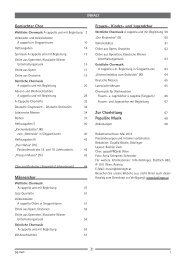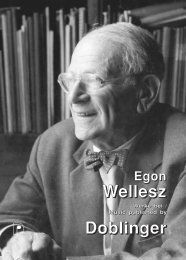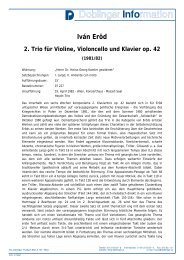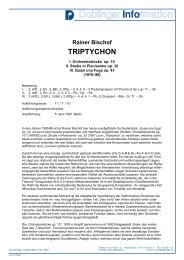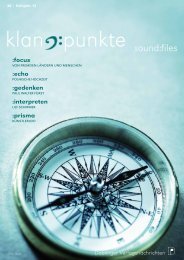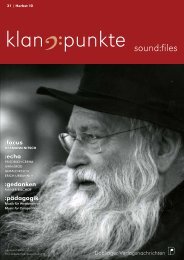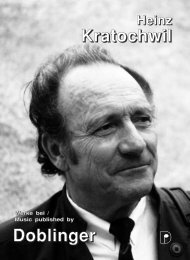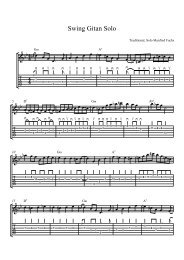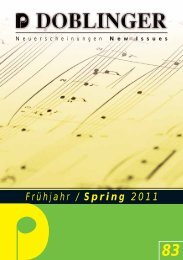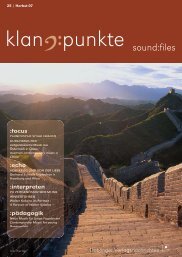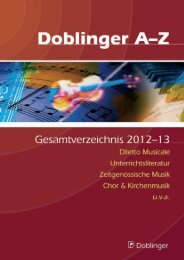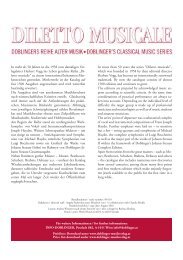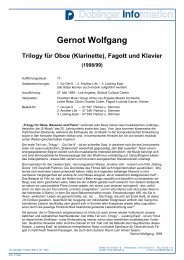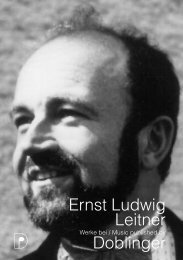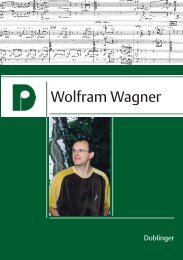Download pdf - bei Doblinger-Musikverlag
Download pdf - bei Doblinger-Musikverlag
Download pdf - bei Doblinger-Musikverlag
Erfolgreiche ePaper selbst erstellen
Machen Sie aus Ihren PDF Publikationen ein blätterbares Flipbook mit unserer einzigartigen Google optimierten e-Paper Software.
klang:focus<br />
Seite 6<br />
„Modern und eigenständig“<br />
Dominik Troger stellt auf operinwien.at fest: „Die Musik wird<br />
oft von sphärischen (Streicher-)klängen bestimmt, die sich mal<br />
träumerisch, mal prägnant ironisierend oder bedrohlich hin und<br />
her wenden, denen ein Akkordeon einige ungewohntere Klangfarben<br />
hinzugesellt, von einem Schlagwerk oft deutlich kontrastriert.<br />
Die Singstimmen sind meist so entwickelt, dass man<br />
sie – wie der Komponist im Einführungsgespräch zur Aufführung<br />
formulierte – ‚als Stimmen hören kann‘. Damit geht eine recht<br />
gute Textverständlichkeit einher. In wenigen Passagen wird dieser<br />
Grundsatz aufgegeben. […] Hier kippt der Part gleichsam ins<br />
Hysterische. Es gibt natürlich Zitate von Alban Berg. Gleich am<br />
eXpreSSiVe, inDepenDent pSYCHo tHriller<br />
a great Hit scored by markus lehmann-Horn’s “Woyzeck 2.0 – traumfalle”<br />
Composer Markus Lehmann-Horn, who was born in Munich<br />
in 1977, was the recipient of the 2009 Gerhard Schedl Music<br />
Award jointly sponsored by the BNP Paribas Foundation, the<br />
music publisher <strong>Doblinger</strong> and the Neue Oper Wien in commemoration<br />
of the achievements in music theater of Austrian composer<br />
Gerhard Schedl (1957–2000): Lehmann-Horn’s project<br />
after a novella by Michael Schneider (the composer <strong>bei</strong>ng his<br />
own librettist), has been chosen by a prominent judging panel<br />
from more than 60 entries by composers from Europe, South<br />
America, Australia, Singapore, Russia and the USA. Before the<br />
backdrop of the theatrical world with its confl icting and mutually<br />
infl uencing spheres of fi ction and reality actress Klara forms a<br />
relationship with Georg, who is serving a prison term and whom<br />
she idealizes to an oppressed creature like Woyzeck. The rude<br />
awakening is inevitable …<br />
Of course, performances are more important to a composer<br />
than prizes and awards (Lehmann-Horn won the 20,000 Euro<br />
Paul Hindemith Prize for his percussion concerto Rot …) – and<br />
on April 17 th it fi nally took place: the world premiere of Woyzeck<br />
2.0 – Traumfalle was staged in Vienna’s Kammeroper in<br />
a production directed by Alexander Medem, designed by Gilles<br />
Gubelmann and conducted by Walter Kobéra, and was enthusiastically<br />
received both by audience and press. “Such a convincing<br />
success is pretty rare in contemporary music theater”,<br />
writes the Kleine Zeitung: the work is a “psycho thriller” with<br />
Beginn hat Lehmann-Horn mit einer ‚Woyzeck Explosion‘ allerhand<br />
davon übereinander geschichtet. Aber es ist nicht so, dass<br />
sich Verbindungen zu Bergs Oper dem Zuhörer aufdrängen<br />
würden. Sie ist keine epigonale ‚Zweitversion‘, sondern in der<br />
Instrumentation und Spielweise durchaus ‚modern‘ und eigenständig<br />
konzipiert.“ Und Peter Dusek fasst im Online-„Merker“<br />
zusammen: „Durchschlagender, großer Erfolg für die ‚Neue<br />
Oper Wien‘ von Walter Kobéra. Die Auftrags-Komposition des<br />
35jährigen bayrischen Komponisten (und Film-Spezialisten)<br />
Markus Lehmann-Horn […] kommt <strong>bei</strong>m Publikum gut an […]<br />
Die Neue Oper unter Walter Kobéra kann sich zur Stückwahl<br />
und professionellen Produktion gratulieren.“<br />
“expressive music”. “The ethereal, wind-dominated chamber<br />
music is kind to the voices and is, with its interludes and culminations,<br />
very well deployed dramaturgically. Connoisseurs may<br />
look for quotations from Alban Berg. The murderer Wozzeck,<br />
however, was only the story’s ‘godfather’, Lehmann-Horn has<br />
found his own musical idiom”, wrote the Salzburger Nachrichten.<br />
The Wiener Zeitung reports a “relaxed and un-dogmatic<br />
approach to today’s plurality of styles”. “This was also shown<br />
in practice: Lehmann-Horn casually combines different musical<br />
idioms -- ranging from Berg quotations and jazz to intentionally<br />
anachronistic major chords -- and skillfully employs timbre effects<br />
for illustrative purposes.” The music is “often defi ned by<br />
ethereal (string) sounds which fl uctuate, sometimes dreamily,<br />
sometimes with incisive irony; an accordion adding some less<br />
familiar timbres, percussion adding a frequently considerable<br />
contrast. […] Of course there are quotations from Alban Berg.<br />
Already at the beginning Lehmann-Horn has built entire strata<br />
of them in a ‘Woyzeck Explosion’. But it is not as if the listener<br />
would have all kinds of associations to Berg’s opera thrust upon<br />
him. This opera is not an epigonic ‘second version’, but ‘modern’<br />
throughout in terms of instrumentation and playing technique,<br />
and independently conceived.” Peter Dusek recapitulates in the<br />
online “Merker”: “Resounding, great success […] The Neue Oper<br />
and Walter Kobéra can congratulate themselves on choosing<br />
this piece and on this highly professional production.”



